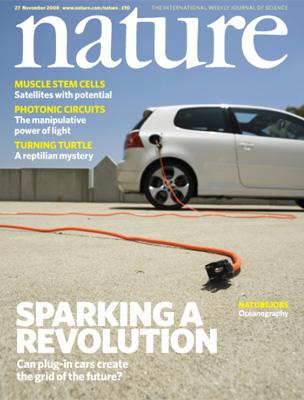Nature journal libel case begins
- Published

A libel case against the scientific journal Nature has begun in the High Court, Central London.
The case has been brought against the publication by an Egyptian scientist, Prof Mohamed El Naschie.
He has claimed that an article published by the journal in November 2008 damaged his reputation.
The counsel acting for the journal told the court on Friday that the article was factually accurate and in the public interest.
Libel reform campaigners have drawn comparisons between the current case and a case brought by the British Chiropractic Association against the science writer Simon Singh, where it was claimed that libel laws were being used to suppress scientific debate.
Three years ago, Nature published an article that alleged that Prof El Naschie self-published many papers, some of which did not seem to have been independently checked by scientists working in the same field of expertise - a process known as peer review.
The article also reported that he listed several affiliations and honorary professorships with international institutions that could not be confirmed.
Prof El Naschie disputed the contents of the article and has sued the journal for libel.
In his opening statement, Andrew Caldecott QC - acting for Nature - said he would use the case to argue that the article was "true, honest opinion and responsible journalism on an issue of public interest".
Mr Caldecott read out sections from the article to the court.
The article alleged that Prof El Naschie, who was set to step down as an editor of a theoretical physics journal at the time, was facing growing criticism that he used its pages to publish numerous papers written by himself.
The article also alleged that five of the 36 papers in the December issue of Prof El Naschie's publication - Chaos, Solitons and Fractals - were written by him and 60 articles had been published since the beginning of the year.
Mr Caldecott said that the scientists contacted by Nature were expressing their honest opinion when they said that Prof El Naschie's papers were of "low quality" and that it was "obvious that there was either zero, or at the very best, very poor peer review of his own papers".
Mr Caldecott said that the article had also published Prof El Naschie's defence of his journal's publication record, saying: "We put more emphasis on the scientific content of the paper and slightly less emphasis on prestigious addresses and impressive affiliations".
The case will continue next week, when Prof El Naschie - who has chosen to represent himself - is set to outline his case, and why he felt it was necessary to bring the case against the journal.
Libel Reform campaigners have compared the action to a libel case last year that was brought against Simon Singh.
Dr Singh was being sued by the British Chiropractic Association because of comments he had made about the effectiveness of chiropractic treatments. He won an appeal that allowed him to use the fair comment defence in the case, which led to the case against him being dropped.
Dr Singh told BBC News that he believed that libel laws and the threat of libel action was inhibiting scientific debate.
"If a massive international publication journal like Nature suffers from libel and is worried about publishing scientific papers, you can imagine what it's like for small academic journals who relentlessly know there are things they need to publish and they ought to publish - but they just don't publish," he said.
Campaigners are calling for current libel laws to be reformed because, they say, the existing system can be used to suppress robust scientific debate and discussion.